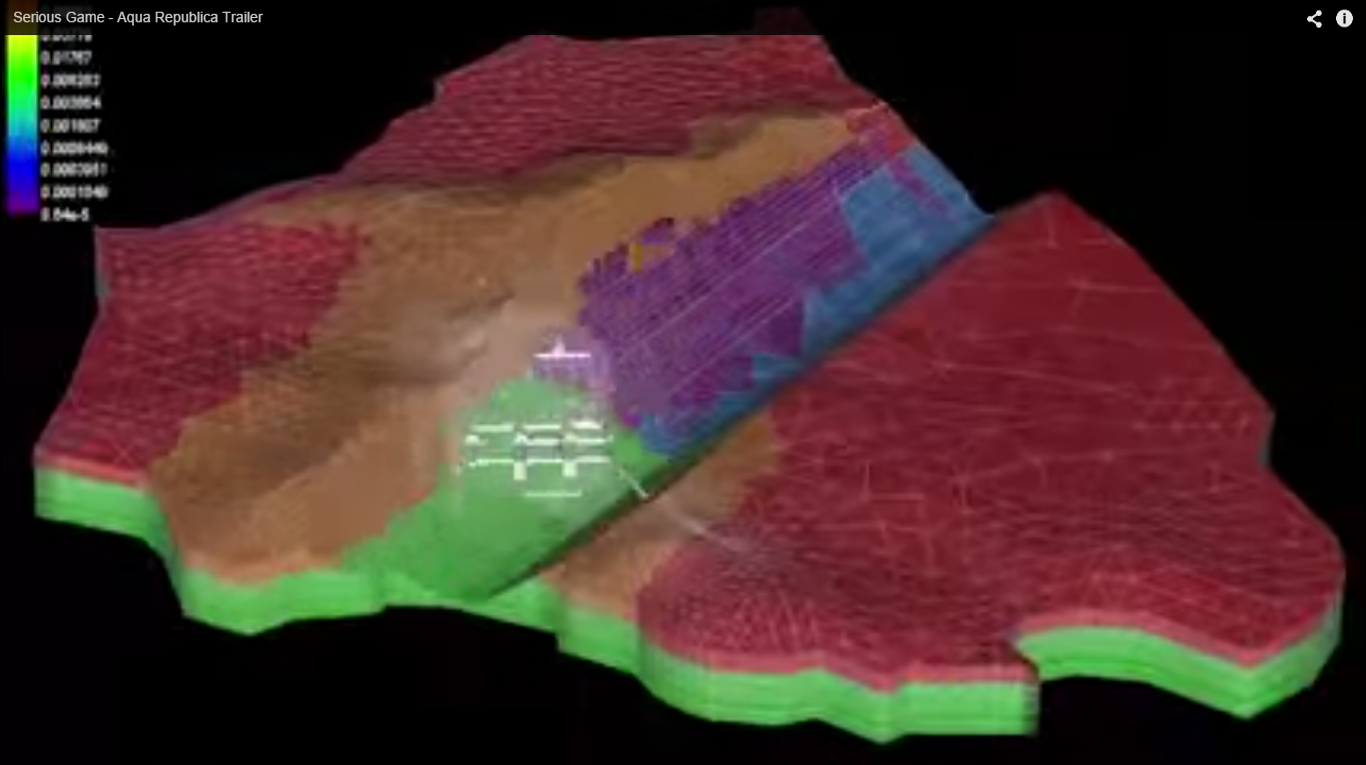The 3rd
edition of the Eco Challenge,
an online "Serious Game" competition targeted at pre-college youth, aims to create
a context for learning about integrated water resources management (IWRM)
through an ecosystem approach.
IWRM is a
process that promotes the coordinated development and management of water,
land and related resources, in order to maximize the resultant economic and
social welfare in an equitable manner without compromising the sustainability
of vital ecosystems.
The game – Aqua Republica, developed by UNEP-DHI
Center, is designed to help players cultivate self-directed learning skills
and develop domain-specific knowledge as well as the ability to transfer
conceptual knowledge to new situations. Players get to exercise independence in
setting goals and making decisions as well as how to achieve the game’s
objective within a given framework.
The
UNEP-DHI Center is a United Nations Environment Program (UNEP) dedicated to
improving the management, development and use of freshwater resources from the
local to the global level. The Center
is hosted at DHI, an independent, international consulting and research-based
not-for-profit foundation of more than 1000 employees, with offices in 26
countries, and with more than 30 years of experience in water resources
management.
Since its
inception in 1996, the Center has become a core resource for UNEP’s work on
freshwater issues and in delivering UNEP’s Programs of Work. The Center’s
ability to draw on DHI’s expertise in water and project implementation, as well
as those of a broad network of partners, is one of its greatest strengths.
UNEP-DHI
Eco Challenge 2015 provides an exciting learning opportunity for students aged
11-17 through the online Serious Game competition.
The
competition is structured in two-tiers - national and international. Teams from
12 countries, Australia - China - Hong Kong - India - Indonesia - Korea - Malaysia
- Philippines - Singapore - Taiwan - Thailand - Vietnam, are ranked nationally
and top teams invited to play in the international round.
Competition
dates are flexible, between October 2014 and March 2015, and students can play
online from anywhere in the world. All
participants receive a certificate acknowledging their involvement and the
top three teams awarded with cash prizes, trophies and medals.
Eco Challenge
2014 experienced an amazing success when a total of 420 teams from over 50
schools across 10 countries in the Asia-Pacific region participated in
the challenge.
About
Aqua Republica – The Strategic Water Resource Serious Game
Aqua Republica is an online "Serious Game" that aims to raise awareness and educate
stakeholders about the importance and challenges of managing limited natural
resources in the face of multiple and often competing demands, in their drive
towards sustainable development.
The
game environment allows players to interact and make
decisions on the management of a catchment, with real time simulation of
hydrological processes, developments and water resources management options.
While the
world of Aqua Republica is fictitious, the challenges of managing a limited
supply of water resources in a situation of growing demand between multiple
users and uses are based on real life scenarios.
A turn-based strategy game,
players are given 12 turns (translated to 20 years) in each game.
There is no time limit to making the next turn, thus allowing discussions and
deliberations before moving on to the next turn.
At the
beginning of each turn, the player will be presented with a “News” screen,
providing updates on the latest events in the game environment. These events can either be random or
triggered by an action taken in the earlier turn. The player can then evaluate
the new state before playing the next turn.
Together,
these “triggered” and “random” events provide a realistic simplification of the
real world so that the player can play and learn through experience, the
conflicts and trade-offs that exist in a river basin, and how to best manage it
to achieve optimal outcome.
To score in
the game, players have to understand and apply the concepts of land fertility
(which affects the placement of farms), gradients of land forms (which affects
location of factories), population growth to water supply, power consumption
vis-à-vis industrial development.
The goal of
the game is to achieve the highest possible score at the end of the 12 turns.
Alone or
together with groups of players, you plan and develop a river basin with
multiple stakeholders. Your area initially contains a river, a small urban area
that includes some businesses and light industry, a few farms and a small power
station. Your aim is to create prosperous living conditions for the population
in a healthy and sustainably managed environment.
As time
moves on, drivers such as population growth, climate change and actions of
other players, force you to adapt to survive and thrive. For example, you may
need to decide to clear a forest area to open up land to expand industry.
However, developments are costly, take time to implement, impact the
environment and other users, as well as your score.
Science Behind The Game
Aqua Republica game mechanics revolve around real science. Numerical computational
models (by MIKE BASIN from DHI) are used in real-time to generate a realistic
game environment especially in terms of water resources and hydrology. This
allows players to also gain an insight into working with nature while
developing their communities.
The virtual
environment consists of two layers – a water allocation and hydrology model
based layer and a game layer which uses the results of the model and links it
to social, economic and environmental factors.
Integrated
water resources management (IWRM) is a broad topic and there is not yet a
version of Aqua Republica that can accommodate all the scopes. So to
overcome this problem, Aqua Republica is split into core and unique versions.
The core
version of Aqua Republica is a framework of game features and game modules
which can be assembled into various unique versions. A partner will
typically be interested in developing a unique version for their own use with a
specific focus.




